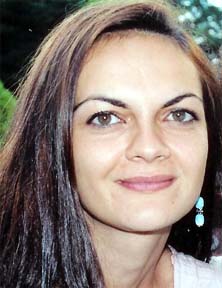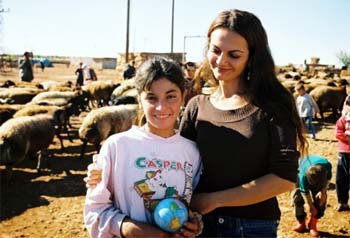Mar 05, 2026
Mar 05, 2026
by V. Radhika
Nearly three decades ago, a spirited young woman from a remote Kurdish village dared to choose the man she wanted to marry and paid a price - with her life. All that remained of Guzide was a sepia photograph and local folklore.
 Thirty years later, Eylem Kaftan wades through dim family memories, a grainy picture and local folklore to resurrect her faceless and anonymous aunt Guzide on celluloid. The documentary film, 'Vendetta Song', directed by Kaftan, 30, won an award at the recently concluded Hot Docs festival in Toronto; it sheds light on the death of Guzide and brings into focus the appalling tradition of honor killing. The film arrived in Toronto after being screening at a film festival in Quebec, where it won the Quebec Film Critics Association's Best Medium-Length Documentary Award.
Thirty years later, Eylem Kaftan wades through dim family memories, a grainy picture and local folklore to resurrect her faceless and anonymous aunt Guzide on celluloid. The documentary film, 'Vendetta Song', directed by Kaftan, 30, won an award at the recently concluded Hot Docs festival in Toronto; it sheds light on the death of Guzide and brings into focus the appalling tradition of honor killing. The film arrived in Toronto after being screening at a film festival in Quebec, where it won the Quebec Film Critics Association's Best Medium-Length Documentary Award.
Honor killing - a traditional practice in which men murder female relatives who are perceived to have brought "dishonor" on the family - persists in many parts of the world, including the Middle East and South Asia, as well as within immigrant communities in Western countries. The United Nations has estimated that as many as 5,000 women are killed in this manner every year. Girls and women can lose their lives for many reasons - from holding hands with a boy to refusing an arranged marriage or even being a victim of rape.
 'Vendetta Song' forces us to look at one of the dark corners of present-day 21st century society. "It is the story of my incredible journey - an account of a senseless vendetta killing, the antiquated customs that brought it about, and one woman's search for connection in an ancient culture she's never known," explains Kaftan.
'Vendetta Song' forces us to look at one of the dark corners of present-day 21st century society. "It is the story of my incredible journey - an account of a senseless vendetta killing, the antiquated customs that brought it about, and one woman's search for connection in an ancient culture she's never known," explains Kaftan.
It is a film she has wanted to make since she was 17. Her mysterious aunt who existed only in memories had been a source of mystery and intrigue to the filmmaker. There was no record of Guzide's existence or death - no letters, and only one photograph of Guzide flanked by two men. None in Kaftan's immediate family, including her father, knew about Guzide because she was sent away as an infant to be raised by relatives in a remote Kurdish village. All Kaftan's father had was that faded photograph and the recollection of an old rumor: that one of these two men took her life in an "honor killing".
And so begins Kaftan's journey from the bustling streets of Istanbul to the distant Kurdish mountains. With nothing but slender clues and a determination to trace the fate of her dead aunt, Kaftan sets out to Millan, the tiny village where Guzide was raised. She begins her search with the piece of news that a young girl has been murdered by her brother for bringing "dishonor" to the family. How? She was raped. A grim reminder that many Guzides blip across the societal radar even today.
When Kaftan returns to her roots in eastern Turkey to uncover the murderer's identity, she finds herself confronting the local traditions that caused her aunt's death. Here, in a place that doesn't appear on any map, she meets people who recall her aunt as a larger than life figure, and who have made her death the subject of folklore and song.
Kaftan puts together the tragic pieces of Guzide's life story; and ultimately, her quest leads her to a meeting with one of the men she suspects of murdering her aunt.
Alongside the main story runs a sub-text, in which Kaftan discovers a world out of time, in which arranged marriages, blood feuds and honor killings are still a part of life. It is a place where men rule, and where a young groom's sister can be given away in payment to the family of his bride as if she were a head of cattle. A place where young girls drop out of school to look after their siblings and young women continue to pay a price with their life for making the choices their contemporaries in other parts of world take for granted.
Making the documentary was not simple. Apart from the woeful lack of information, Kaftan was also apprehensive about her security as well as that of her crew. The fact that Kurdish rebels are engaged in a separatist war exacerbated their concerns. "I was scared I would be killed or my crew would be hurt. But it is the first step that is the most important. Until you take that step you have anxiety, fear and uncertainty but once you do, a whole new world opens up. The Kurdish people were so amazingly open and helpful."
Kaftan says her desire to make a film was also spurred by the need to know the truth. "My investigation and truth overlapped. I looked up to Guzide as a role model even though society tried to erase her from history. In a way, it is my revenge on the people who killed her..."
The first girl in her father's family to receive a university education, Kaftan is amazed that the very steps she takes with so much ease cost her female ancestors their lives. "I feel I owe something to these women. My work is a way of empowering myself and hoping it will touch other lives," she says. Kaftan was born in Turkey; and she graduated in philosophy at the Bogazici University in Istanbul, and then completed her Master's in film at York University in Toronto. Her first documentary, 'Faultlines', which investigates the aftermath of the earthquake that hit Turkey in 1999, won the Best Short Film and the Jury Prize at the Planet Indie Film Festival in Toronto.
The selection of 'Vendetta Song' at Hot Docs "thrilled" her. "Hot Docs is very selective about the documentaries it chooses. It receives hundreds of films from around the world. The recognition is fabulous." Winning an award has been the icing on the cake.
The Montreal-based filmmaker whose name means "action" has been active in the women's movement in Turkey. She now divides her time between Turkey and Canada. Currently, Kaftan is co-directing a film about Montreal's non-status Algerians for T'l'-Qu'bec. She has also contributed to several Canadian documentaries on social and political issues, including immigration, women's rights, mental illness and culture shock.
Kaftan intends to make feature films in the future, and she is working on a few ideas. "They (her ideas) are incomplete souls wandering around me," she quips, "every film is like a lover...it is hard to take more than one at a time."
29-May-2005
More by : V. Radhika